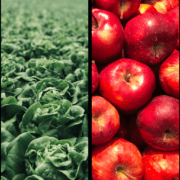30 June 2020
The past few months have been extremely challenging and have tested our environment and us as a society. COVID-19 has proven difficult for plastic fighters worldwide because it increased the need for plastic personal protective equipment (PPE) and the use of disposable items at restaurants and home. The consequences are impossible to ignore, with pictures of streets, seas, and rivers covered in gloves and face masks.
However, we are determined to keep fighting for a cleaner and healthier world, and that’s why we are joining Plastic Free July, and we encourage you to do it with us! Plastic Free July’s goal is to avoid as many plastic items in your life for a whole month and replace them with a sustainable alternative. Don’t worry! While we know this year’s challenge will be a completely different experience, we want to guide you through it during the entire month with solutions and ideas.
Studies have shown that COVID-19 can survive two to three days on plastic surfaces. Hence single-use plastic is no safer or unsafe than the plastic used more than once, as opposed to what the plastics industry is lobbying for. But we can and should continue our fight!
The Plastic Free July Challenge
We have gathered a few tips to reduce your plastic footprint during this month and help you quit single-use plastics in these extra challenging times of COVID-19.
Reusable bottles on-the-go

 Carrying your own reusable bottle – be it of steel, glass or hard plastic – is entirely safe, as long as you regularly wash it with water and soap. Do you have a dishwasher? Even better! High temperature and prolonged washing are beneficial when it comes to killing the virus.
Carrying your own reusable bottle – be it of steel, glass or hard plastic – is entirely safe, as long as you regularly wash it with water and soap. Do you have a dishwasher? Even better! High temperature and prolonged washing are beneficial when it comes to killing the virus.
Wet wipes
Using wet wipes, both before and during the pandemic, has always been a matter of convenience. However, there is a common misconception that wet wipes are safer to prevent the spread of COVID-19, so many people have started to use them more and, what’s worse, are flushing them down the toilet.
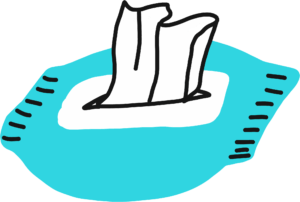
 This has only caused an increase in plastic waste and the accumulation of wipes and sanitary towels in wastewater treatment plants. Studies show that half of the wet-wipe brands labeled as ‘flushable’ contained harmful plastic microfibers that end up in the waters worldwide. How to prevent this? Use a reusable cloth with disinfectant and, if you use wet wipes, DO NOT flush them.
This has only caused an increase in plastic waste and the accumulation of wipes and sanitary towels in wastewater treatment plants. Studies show that half of the wet-wipe brands labeled as ‘flushable’ contained harmful plastic microfibers that end up in the waters worldwide. How to prevent this? Use a reusable cloth with disinfectant and, if you use wet wipes, DO NOT flush them.
Grocery bags

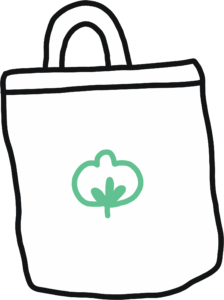 The pandemic has spurred up fear about reusables and its potential to spread the virus, causing a step back in some movements to ban plastic bags around the world. However, the fact that reusable grocery bags are unsafe is not necessarily true as long as you regularly wash and disinfect them. So, you’re still safe to use your reusable grocery bag when going to the supermarket!
The pandemic has spurred up fear about reusables and its potential to spread the virus, causing a step back in some movements to ban plastic bags around the world. However, the fact that reusable grocery bags are unsafe is not necessarily true as long as you regularly wash and disinfect them. So, you’re still safe to use your reusable grocery bag when going to the supermarket!
Containers

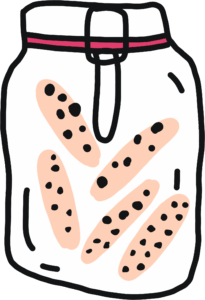 Glass, metal, and even hard plastic containers are entirely safe to use if you wash them regularly – preferably in the dishwasher – to make sure they are adequately disinfected. But always remember NOT to put your plastic containers in the microwave as they might release harmful toxins in your food when heated up.
Glass, metal, and even hard plastic containers are entirely safe to use if you wash them regularly – preferably in the dishwasher – to make sure they are adequately disinfected. But always remember NOT to put your plastic containers in the microwave as they might release harmful toxins in your food when heated up.
Reusable cups
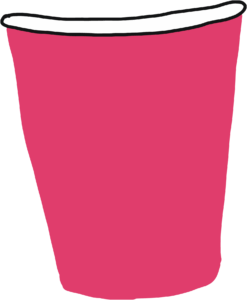
 We understand the convenience and feeling of hygiene of a disposable plastic cup, but there is still no evidence that disposable plastic items are safer than reusable ones. Reusable cups are completely safe if you thoroughly wash them with soap. And, as we mentioned above, wash them in a dishwasher when possible. Next time you’re meeting your friends at a party or picnic, don’t forget to grab your reusable cup!
We understand the convenience and feeling of hygiene of a disposable plastic cup, but there is still no evidence that disposable plastic items are safer than reusable ones. Reusable cups are completely safe if you thoroughly wash them with soap. And, as we mentioned above, wash them in a dishwasher when possible. Next time you’re meeting your friends at a party or picnic, don’t forget to grab your reusable cup!
Clothes
 One of the things that this pandemic has taught us is the philosophy of ‘buy less, buy better’. It has already been adopted by the generation Z – those aged 18 to 24 – and it is here to stay. This change of perspective has encouraged consumers to fix broken items instead of buying new ones. That’s why, throughout this month, we want to challenge you not to buy any new clothes and to wash them less often. When doing the laundry, follow our sustainable guidelines: avoid long washes, wash at low temperatures, and hang your clothes up to dry!
One of the things that this pandemic has taught us is the philosophy of ‘buy less, buy better’. It has already been adopted by the generation Z – those aged 18 to 24 – and it is here to stay. This change of perspective has encouraged consumers to fix broken items instead of buying new ones. That’s why, throughout this month, we want to challenge you not to buy any new clothes and to wash them less often. When doing the laundry, follow our sustainable guidelines: avoid long washes, wash at low temperatures, and hang your clothes up to dry!
And last but not least, the unavoidable: gloves and face masks
This pandemic has increased demand for single-use plastic items, especially medical waste, from personal protective equipment (PPE) such as masks and gloves, and single-use plastics.
It is essential to protect public health and to stop the spread of the COVID-19 urgently. However, we should take responsibility for the items that we use: do not throw used gloves and face masks in the street, as they pose a threat to the environment and a health hazard to people who might get in contact with them. These items cannot generally be safely reused or recycled, so make sure to throw them to the general waste.
If you do not work in the health sector, it is safe to use a reusable face mask and wash it regularly at a high temperature, to prevent the spread of the virus.
The tips above are just a start on your Plastic Free July journey. We want to challenge you to do much more. Do you think you can completely cut all plastic out of your life? We’d love to know! So, make sure you tag us on social media!
What else can you do to make your Plastic Free July easier? We have created a detailed plastic diet to bring your plastic footprint to an absolute minimum. And you will find this plastic diet in our app My Little Plastic Footprint. Choose among +100 items from one of the following six areas of your life: bathroom, kitchen, leisure, travel, home, and garden.
Good luck and happy Plastic Free July!
You might also like





 The pandemic has spurred up fear about reusables and its potential to spread the virus, causing a step back in some movements to ban plastic bags around the world. However, the fact that reusable grocery bags are unsafe is not necessarily true as long as you regularly wash and disinfect them. So, you’re still safe to use your reusable grocery bag when going to the supermarket!
The pandemic has spurred up fear about reusables and its potential to spread the virus, causing a step back in some movements to ban plastic bags around the world. However, the fact that reusable grocery bags are unsafe is not necessarily true as long as you regularly wash and disinfect them. So, you’re still safe to use your reusable grocery bag when going to the supermarket!
 Glass, metal, and even hard plastic containers are entirely safe to use if you wash them regularly – preferably in the dishwasher – to make sure they are adequately disinfected. But always remember NOT to put your plastic containers in the microwave as they might release harmful toxins in your food when heated up.
Glass, metal, and even hard plastic containers are entirely safe to use if you wash them regularly – preferably in the dishwasher – to make sure they are adequately disinfected. But always remember NOT to put your plastic containers in the microwave as they might release harmful toxins in your food when heated up. 





